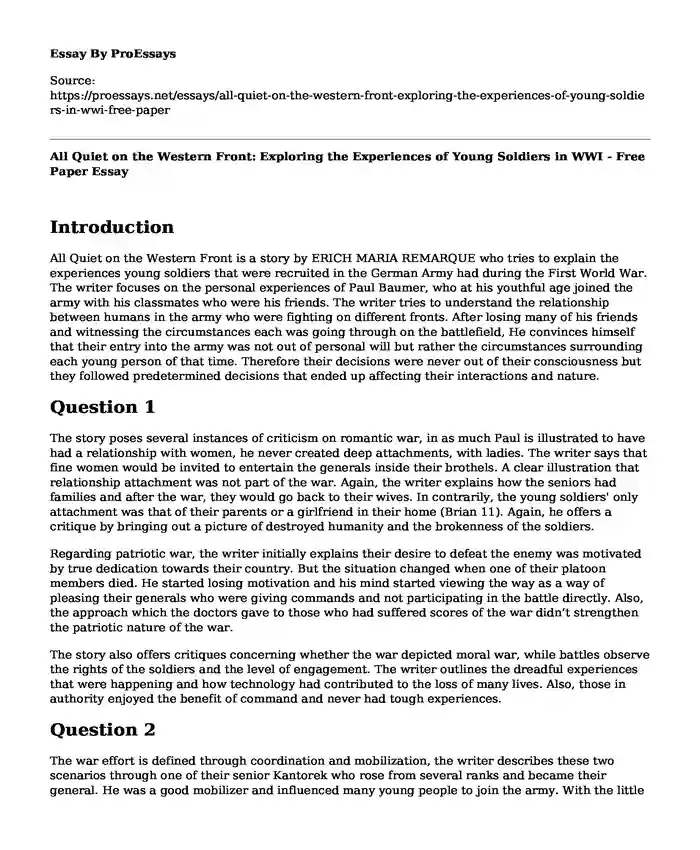Introduction
All Quiet on the Western Front is a story by ERICH MARIA REMARQUE who tries to explain the experiences young soldiers that were recruited in the German Army had during the First World War. The writer focuses on the personal experiences of Paul Baumer, who at his youthful age joined the army with his classmates who were his friends. The writer tries to understand the relationship between humans in the army who were fighting on different fronts. After losing many of his friends and witnessing the circumstances each was going through on the battlefield, He convinces himself that their entry into the army was not out of personal will but rather the circumstances surrounding each young person of that time. Therefore their decisions were never out of their consciousness but they followed predetermined decisions that ended up affecting their interactions and nature.
Question 1
The story poses several instances of criticism on romantic war, in as much Paul is illustrated to have had a relationship with women, he never created deep attachments, with ladies. The writer says that fine women would be invited to entertain the generals inside their brothels. A clear illustration that relationship attachment was not part of the war. Again, the writer explains how the seniors had families and after the war, they would go back to their wives. In contrarily, the young soldiers' only attachment was that of their parents or a girlfriend in their home (Brian 11). Again, he offers a critique by bringing out a picture of destroyed humanity and the brokenness of the soldiers.
Regarding patriotic war, the writer initially explains their desire to defeat the enemy was motivated by true dedication towards their country. But the situation changed when one of their platoon members died. He started losing motivation and his mind started viewing the way as a way of pleasing their generals who were giving commands and not participating in the battle directly. Also, the approach which the doctors gave to those who had suffered scores of the war didn’t strengthen the patriotic nature of the war.
The story also offers critiques concerning whether the war depicted moral war, while battles observe the rights of the soldiers and the level of engagement. The writer outlines the dreadful experiences that were happening and how technology had contributed to the loss of many lives. Also, those in authority enjoyed the benefit of command and never had tough experiences.
Question 2
The war effort is defined through coordination and mobilization, the writer describes these two scenarios through one of their senior Kantorek who rose from several ranks and became their general. He was a good mobilizer and influenced many young people to join the army. With the little experience, he was leading the youthful soldiers through battles and consequently, led to many of them losing their lives. The writer acknowledges that their first bombardment made them realize many mistakes away from what they had been taught (pg. 13). He, therefore, describes it as a failure from those who controlled the war.
Question 3
The true enemies were those in authority. The writer's encounters made him start questioning how common young people from both fronts would mercilessly kill each other without hesitation. He explains that they were respecting commands from their generals who were not concerned with human life but with winning the battle (Brian 26).
Question 4
The writer defines right as when one does something that justifies need. According to Erich Maria, “But as it is the boots are quite inappropriate to Kemmerich's circumstances, whereas Müller can make good use of them.”(8)
Wrong is when you know the right thing but still end up following the opposite.
We loved our country as much as they; we went courageously into every action; but also we distinguished the false from true, we had suddenly learned to see. And we saw that there was nothing of their world left (Brian 12-13).
The writer defines good as being considerate and bad as a disregard for what is needful.
They don't have so much work to do afterward. It is more convenient, too, because it lies right beside the lift to the mortuary. Perhaps they do it for the sake of the others also, so that no one in the ward dies in sympathy. And they can look after him better, too, if he is by himself. (Brian 122)
Conclusion
World War 1 was superiority-driven and focused more on achieving goals set by those in authority through youthful soldiers whose lives were broken and their sense of humanity broken. For instance, Paul cannot imagine a future without war. The legacy attained was, therefore, the broken hearts of the participants who had no alternative but to follow commands.
Work Cited
Murdoch, Brian. All Quiet on the Western Front, by Erich Maria Remarque. Salem Press, 2011.
Cite this page
All Quiet on the Western Front: Exploring the Experiences of Young Soldiers in WWI - Free Paper. (2023, Nov 24). Retrieved from https://proessays.net/essays/all-quiet-on-the-western-front-exploring-the-experiences-of-young-soldiers-in-wwi-free-paper
If you are the original author of this essay and no longer wish to have it published on the ProEssays website, please click below to request its removal:
- Essay Sample on Mythology Theory in Popular Culture
- The Road Not Taken by Robert Frost Essay Example
- Power Struggles in The Tempest Essay
- The Razor Edge Analysis Essay Example
- Araby by James Joyce Analysis Essay Example
- Cervantes' El Celoso Extremeno: Wealthy Man's Unexpected Opportunity - Essay Sample
- Paper Example on Adaptations: A Comprehensive Anthology of Short Stories and Films







